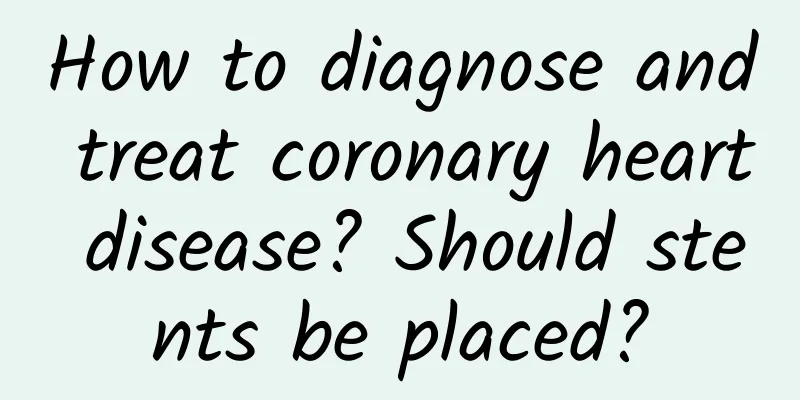How to diagnose and treat coronary heart disease? Should stents be placed?

|
Coronary heart disease is a cardiovascular disease caused by insufficient blood supply to the coronary arteries. In severe cases, it can also cause complications such as myocardial infarction. In the process of treating coronary heart disease, it is generally necessary to consider the patient's specific condition, symptoms, heart function, and the degree of coronary artery stenosis. This article will give you a detailed understanding of the diagnosis and treatment of coronary heart disease and the considerations for stent placement. 1.What is coronary heart disease ? Coronary heart disease is a chronic cardiovascular disease mainly caused by atherosclerosis. When the coronary arteries are narrowed or blocked, the heart muscle will not be able to obtain enough oxygen and nutrients normally. 2.What are the symptoms of coronary heart disease? (1) Angina pectoris (2) Compression chest pain (3) Difficulty breathing, shortness of breath, cough (4) Arrhythmia, tachycardia or bradycardia, and palpitations (5) Easy fatigue, weakness, and lack of energy (6) Indigestion (7) Nausea, vomiting, and cold sweats 3.What are the methods for diagnosing coronary heart disease? (1) Symptom assessment: The doctor will ask the patient about his or her medical history, symptoms, and risk factors, including chest pain, angina, fatigue, dyspnea, arrhythmia, high blood pressure, high cholesterol, diabetes, etc. (2) Electrocardiogram: It can record the electrical activity of the heart and detect signs of myocardial ischemia. (3) Exercise test: By having the patient perform physical activity, the changes in the electrocardiogram (ECG) are observed and the heart's response under load is evaluated. (4) Cardiac ultrasound examination: can evaluate the heart structure, function and blood flow. (5) Radionuclide myocardial perfusion scan: By injecting tracers, the blood perfusion of the myocardium is observed and myocardial ischemia is detected. (6) Magnetic resonance imaging: It can provide high-resolution cardiac images, evaluate myocardial structure and function, and detect coronary artery lesions. (7) Coronary angiography: Contrast agent can be injected into the coronary artery to observe the stenosis and blockage of the blood vessels. (8) Cardiovascular angiography: By inserting a catheter into the heart vessels and using contrast agents, the condition of the heart vessels can be observed and blood flow and coronary artery disease can be assessed. (9) Vascular ultrasound endoscopy: can directly observe the condition of the coronary artery endothelium. 4.What are the treatments for coronary heart disease? (1) Drug treatment: ① Vasodilators: Drugs such as nitroglycerin can dilate coronary arteries, increase blood supply to the heart, and relieve symptoms such as angina pectoris. ② Antiplatelet drugs: Drugs such as aspirin can inhibit platelet aggregation and prevent the formation of blood clots. ③ Anticoagulant drugs: Warfarin and other drugs are suitable for some patients with coronary heart disease and atrial fibrillation. They can reduce blood coagulation and prevent the formation of blood clots. ④β-receptor blockers: Drugs such as metoprolol and atenolol can help control the frequency and symptoms of angina pectoris, reduce the burden on the heart, and prevent the occurrence of myocardial infarction. (2) Change your lifestyle ① Quit smoking: It can significantly reduce the risk of coronary heart disease and improve cardiovascular health. ② Balanced diet: Eat less high-fat, high-cholesterol and high-salt foods, and increase the intake of vegetables, fruits, whole grains and foods rich in healthy fats (such as fish and nuts). ③Moderate exercise: Doing appropriate aerobic exercises such as brisk walking, jogging, swimming, etc. can improve cardiovascular health, further lower blood pressure, blood sugar and cholesterol levels, and enhance heart function. ④Maintain a healthy weight (3) Interventional treatment ① Stent implantation: It is a relatively common interventional treatment method that can restore blood flow, improve myocardial blood supply, and relieve angina symptoms. ②Coronary artery bypass grafting: For patients with severe coronary heart disease and multiple blood vessel involvement, it can restore blood supply to the myocardium and improve heart function. (4) Cardiac rehabilitation program: It is a comprehensive treatment program that mainly includes exercise training, nutritional guidance, psychological support and education tailored to the patient's specific situation to help improve the patient's cardiovascular health and quality of life. (5) Psychological support: Psychological counseling, psychotherapy and other means can be used to help patients adjust their mindset and develop a positive attitude towards life. 5. What factors should be considered when deciding whether to place a stent? (1) Patients with mild symptoms can take medication and adjust their lifestyle without the need for stents. (2) Patients with more obvious symptoms can undergo stenting (3) Stent placement can be used for patients who are not effectively treated with medication. (4) Patients with a healthy overall health condition who are suitable for stenting can undergo stenting summary The diagnosis and treatment of coronary heart disease requires comprehensive consideration of various factors and selection of the most appropriate treatment plan. Stent placement is only one of the options, not the only treatment approach. Author: Sun Zhijun, Cangzhou Wuqiao County People's Hospital |
<<: Prevention and treatment of endometriosis
>>: What is arrhythmia? What are the solutions for arrhythmia?
Recommend
How to set desktop time on OPPO phone? What to do if the screen of OPPO phone fails
In recent issues, we have been sharing with you t...
What are the precautions for induced abortion in 4 months of pregnancy?
There are risks in induced abortion no matter how...
26 days after delivery, lochia turns into blood again
Pregnant women will have lochia right after givin...
Can I get my nails done while pregnant?
Doing manicures is a normal expression of every f...
Obesity is no longer a symbol of wealth, but a "petri dish" for disease
In the past, many people did not think that obesi...
Can I drink slimming tea during menstruation? What should I pay attention to?
Many female friends have the habit of drinking sl...
Older "straight men" have no friends, this is a serious study
In 2014, Emma Watson launched a campaign called &...
Fetal heart rate 148 is a boy or a girl
When a woman is ten weeks pregnant, she can monit...
How to make bangs grow faster
Some people's hair grows very slowly, or they...
Why do girls have the most private parts?
When girls reach puberty, their private parts wil...
What to do if your uterus prolapses after giving birth
After giving birth, new mothers are prone to uter...
What causes bleeding after sex?
Sometimes you will encounter many problems which ...
What is the difference between green kumquat and kumquat? Which one is better for cough relief?
Traditional Chinese medicine believes that kumqua...
I ejaculated inside on the fifth day of my period.
Some couples who choose safe period contraception...
Cleaning your mouth is important, brush your teeth, rinse your mouth and use dental floss
Cleaning your mouth is important, brush your teet...









